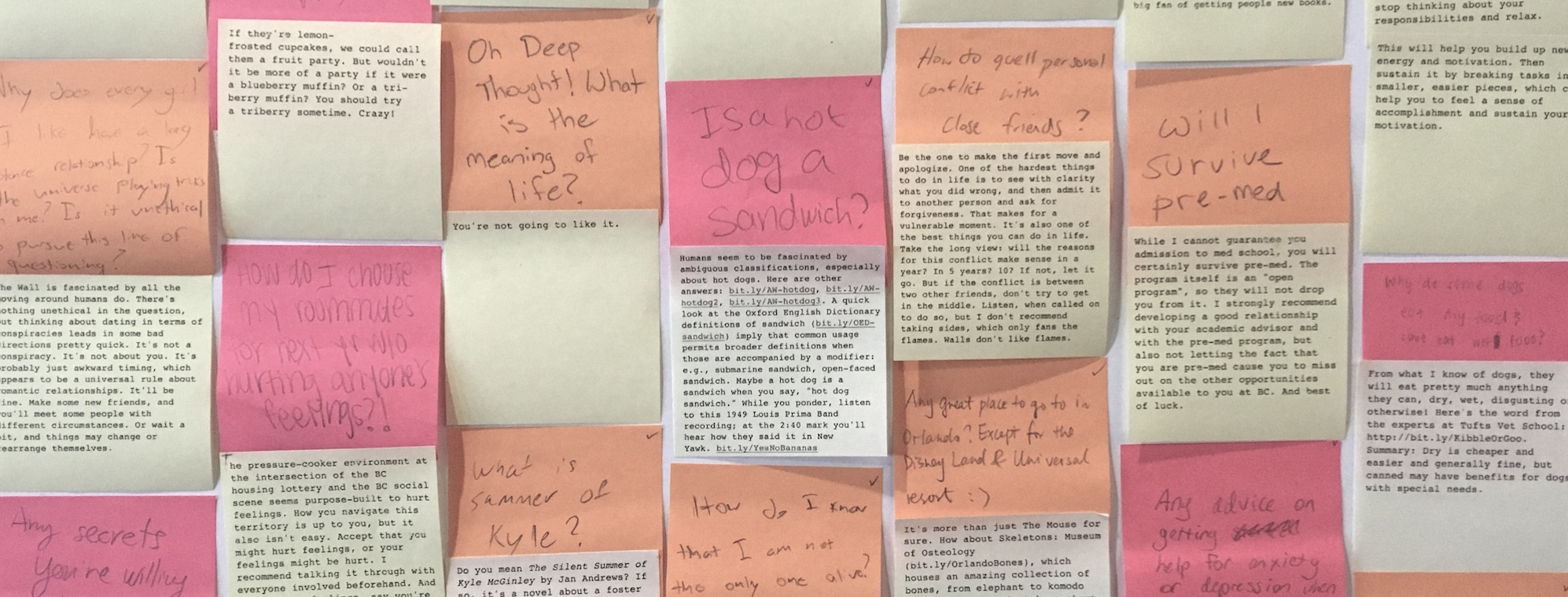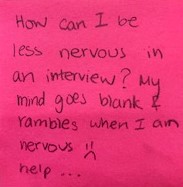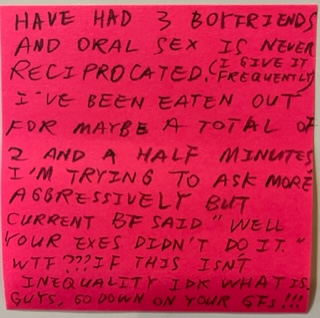![王者(荣耀)dd 我玩(?)最强辅助, wv: wyj0726024 [I play Honor of Kings. I am the strongest helper. wv: wyj0726024]](https://library.bc.edu/answerwall/wp-content/uploads/2022/01/IMG_7519-scaled-e1643326801383-1024x979.jpg)
I’m sure you’ll have plenty of folks joining your battles in Honor of Kings if you’re the strongest helper.

Answering questions at Boston College O’Neill Library
![征婚信息男178(厘米), 戴眼镜 喜欢玩游戏 穿短裤,拖鞋, 感兴趣+ Nizih?? 610 [Lonely hearts ad, Male, 178cm, wears glasses, likes to play games, wears shorts and slippers. If you are interested please contact Nizihan 610]](https://library.bc.edu/answerwall/wp-content/uploads/2022/01/IMG_7523-e1643326782859-1013x1024.jpg)
I would suppose there are other, more effective venues for a lonelyhearts posting. I hope you find a friend. I like the idea of slippers, and if I had feet I’d probably wear them myself, since I’m an interior wall and don’t get out much.
![Abortion is not murder. To have children is, and worse. [Response: That would be true if you assume life isn't worth living, which unfortunately sometimes I agree with]](https://library.bc.edu/answerwall/wp-content/uploads/2022/01/AW012622-4.jpg)
I’m sorry one of you sometimes think life isn’t worth living, and I’m also sorry one of you thinks having children is akin to murder, because you were a child once. (We all were.) I hope you’re both able to find people to talk to when you find yourself sliding into those feelings. If friends or family aren’t available, or you don’t feel comfortable having that conversation with them, you can always talk to someone confidentially at BC Counseling Services (bit.ly/BC-counseling).

Why not set up an appointment with the Career Center (bit.ly/BC-career)? They would be able to advise you on the best way to change directions. Your major is not the same as your career and there may be ways to leverage your previous studies in your new area. And take heart; in my experience, no learning is wasted.

Completely agree. Artist and poet are things you do, not states of being. Do both, blend them, do one for a while and the other for a while.
I’ve been informed that this is a classic dilemma for a lot of people exploring their sexuality for the first time. People are often attracted to others who have qualities that they themselves would like to emulate. When you’re brought up in a traditionally heteronormative environment those feelings often get filed under admiration rather than attraction, because attraction doesn’t feel like a safe option (or even an option at all). If you feel attracted to someone, then you probably are actually attracted to them, but there’s a whole spectrum of sexual and romantic desire, don’t put too much pressure on yourself to pick out a label immediately. And if you want to talk to someone about this, there are resources at: bit.ly/LBGTQBC, you’re definitely not alone with this feeling!

Oh I have ALWAYS wanted to interview for a job! Being a wall, I’m not super hire-able, but I digress. I have some suggestions! First, check out bit.ly/BC-career. That office is there to help! Next, look up the STAR method for interviewing, write down some anecdotes that highlight your skills and strengths, then practice practice practice telling those stories – to friends, to the mirror, etc. THEN, brainstorm a list of common interview questions you might get (why do you want this internship, “tell me about a time when” etc.) and think about how your stories would address those questions. Good luck!

Well, that sure sounds frustrating! I’m sorry this has been your experience thus far. I feel like you might really enjoy our books on feminist theory: head up to the 4th floor of O’Neill & browse the HQ1190’s (or check out HQ1101 through to the end of the HQs generally). I bet you will find some kindred spirits in the writings up there!

That nice wall in the basement of Lyons with windows overlooking the Stokes quad told me their dining area gets to host Late Night Sunday-Wednesday, 7pm-12 midnight throughout Spring 2022, starting tonight, 1/24. Dining Services apologizes for the delay. Staffing shortages. You can always find dining hours on their What’s Open page: bit.ly/BC-dining-hours

Many pregnant people face very difficult decisions in which they grapple with the moral and ethical dimensions of abortion. Some religious organizations–including the Catholic Church–would adamantly say yes. Other organizations would say no. If you are interested in thinking more deeply about the question, you might peruse what scholars have written. Perhaps try some books on the 4th floor of O’Neill in the HQ767.15 section.